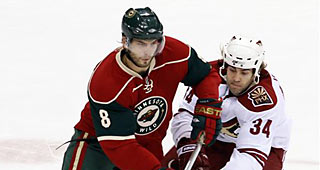One of the most difficult positions to fill in the NHL is a top-pairing defenseman; they are not typically available on the trade market, and cost a fortune on the free agent market. And when the San Jose Sharks were eliminated by the Vancouver Canucks in the playoffs this past season it was quite evident that their blueline was severely lacking top-end talent outside of an aging Dan Boyle.
That void was filled during the first day of the 2011 draft when Sharks GM Doug Wilson landed 26-year-old All-Star Brent Burns and a second round pick from the Minnesota Wild in exchange for Devin Setoguchi (who signed a three-year extension the day before), the 28th pick in 2011 and prospect Charlie Coyle, who was drafted 28th in 2010.
Burns was drafted as a forward in 2003 (20th overall), but converted to a defenseman shortly thereafter. His best assets are his speed and puck moving ability from the blueline, using his instincts developed when he played the wing. His size makes him an intimidating defender, and combined they make for a fairly complete player.
Burns has scored 15+ goals twice in his career, but has battled injuries throughout his short career (concussions, shoulder); two of the last four years he played fewer than 60 games. In 453 career games he has registered 55-128-183, but in 2007-08 he put up 15-28-43, and this past season he had 17-29-46. Take into account the weak offensive teams that he played on in Minnesota, and it will be hard for him not to flirt with the 60-point plateau with the Sharks.
Contractually, Burns is entering the final year of a four-year contract that carries a $3.55M cap hit, and is due to become an unrestricted free agent after next season. It will be imperative for Wilson to get him locked in before that happens, as reaching the open market will only increase his value financially. Looking ahead to 2012-13, San Jose already has $46M in commitments, so they will need to fill a number of holes up front with cheaper/younger players if they want to sign Burns to an extension that will likely net him in the $5.5M-$6M per year range.
Grade for San Jose: A-
Many reports have surfaced after the trade was completed that make it seem like trading Burns was a necessity for the Wild. Wild GM Chuck Fletcher and the agent for Burns have a history of disagreements dating back to former Minny player Marian Gaborik, and things allegedly did not look promising for the Wild in keeping Burns beyond this coming season. If that is the case, kudos to them for getting good value before the word made its way around the league.
In Setoguchi, the Wild get a much needed boost to a forward group that struggles to score goals. Over the last three seasons, Devin has scored 31, 20 (in 70 games) and 22 goals (72 games) respectively, while contributing 12 goals in their last 33 playoff games. To compare: the team leader in goals for the Wild (Martin Havlat) had 22 this year, which was 69th in the NHL.
Setoguchi is merely 24-years-old and signed for the next three years at $3M per season, very affordable for a team that spends up to the cap ceiling.
Coyle is a winger currently playing at Boston University, so it remains to be seen when he will play in the NHL. He is only 19-years-old, and scored 63 points in 42 games in Junior A in 2009-10. Minnesota used the 28th pick this year on center Zack Phillips, who was ranked 15th by Central Scouting.
Minnesota turned a valuable commodity that they were not able to retain into three nice young forwards that should help them improve offensively now and in the long run. Sadly, it will not do much to their reputation as a team unable to hold onto their star players.
Grade for Minnesota: A-


